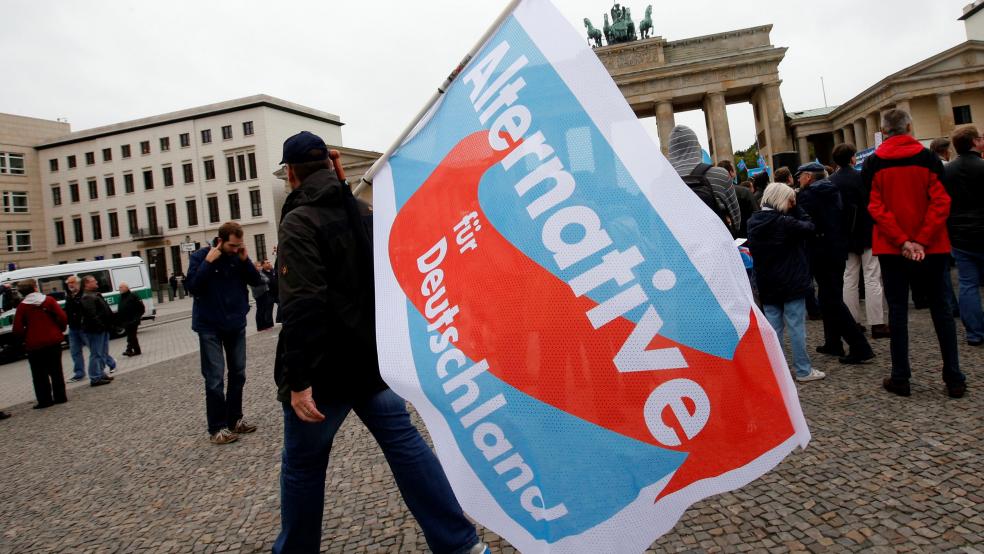Berlin - Ted Cruz and the Tea Party are having what might amount to one last moment of glory in the Washington sun, threatening to shut down the government and delay the debt ceiling in an effort to derail the Affordable Health Care Act.
It might be their last big moment since Gallup polls show that support for the group dropped to 22 percent, just one percent above the 2012 low of 21 percent.
But here in Germany, support for what many have called the German Tea Party is at an all-time high.
The Alternative für Deutschland (Alternative for Germany) party, which ran on a platform of isolationism and Germany’s exit from the eurozone, received 4.7 percent of the popular vote. By comparison, the pro-business Free Democratic Party that had formed a coalition government with Chancellor Angela Merkel in 2009, received 4.8 percent.
The result is a major political win for a party that started just six months ago. German political and business heavyweights have joined their cause, including World Bank economist Bernd Lucke, entrepreneur Frauke Petry, and publicist and former editor of the influential Frankfurter Allgemeine Zeitung Konrad Adam.
Their election success is also a warning shot across the bow of the German political establishment. The group came very close to the 5 percent threshold that would have allowed them to sit in the German parliament, the Bundestag. If that had occurred, it would have been the first time that a party openly opposed the actions Germany has taken to save the eurozone.
"We continue to believe that it's important to have a political force that is willing to discuss the common currency and European bailout policies, and this force is the AfD," Bernd Lucke, the party's chief, said after last Sunday's election. "The ball is in our court now and we are ready for it."
"We put fear in the hearts of other parties," Lucke, a macroeconomics professor at the University of Hamburg, added. "We have made democracy in Germany richer and stronger."
FOR SOME, A WARNING SIGN
The rise of the AFD has raised concerns that extremist political parties are quietly reemerging across the continent.
"Self-styled as a middle-class, intellectual and moderate force, the AFD showing is significant strength, particularly in a country that, for historical reasons, has been wary of political extremism," Suzanne Lynch, a writer for the Irish Times, commented after the election. "The rise of far-right and far-left movements in Europe has been a feature of the European political landscape since at least the 1980s. But this recession has helped fuel the momentum of parties."
The rise of the AFD coincides with growing euro-skepticism from the German public. Polls show that between 20 and 30 percent of Germans are skeptical of the euro. Their isolationist views are similar to those of the Tea Party, whose members believe in a minimalist government that does not interfere with daily life. They also attract similar demographics: Exit polls showed that the vast majority of AfD supporters were over 55. Similarly, the Tea Party attracts older voters.
And just as the Tea Party has been accused of being anti-immigrant, the AfD has been accused of being anti-Europe. Given Germany’s outsized roll in steadying the European Union, any anti-European rhetoric coming out of Berlin is troubling for the rest of the continent. Had they made it into parliament, they would have been able to loudly protest a third Greek bailout, which is expected this fall.
But any extremist rhetoric coming out of Germany touches a nerve, both in Berlin and elsewhere. Given their history, Germans are very reluctant to make provocative statements about race or ethnicity within the European Union. When those statements have bubbled up, they came from Neo-Nazi extremists. Now, anti-Europe comments are being made by business leaders and intellectuals – the people who in the past would have been reluctant to voice such views.
CAN AFD LAST?
It remains to be seen whether AfD’s success is a blip or representative of an emerging movement. They staked their political claim on euro skepticism, and have yet to outline policies on energy, security and social welfare benefits.
But there is a clear path for the AfD to remain relevant. Turnout for European Union elections is much lower than federal elections (72 percent for the 2013 federal election; 43 percent for the 2009 EU election). If AfD can muster a large turnout effort, they might be able to secure an anti-Europe voice in Brussels.
That appears to be their strategy. Alexander Gauland, a member of AfD’s executive board, told Der Spiegel that the party is now turning attention to the EU election set for next year.
"It's important that the party doesn't fall behind," he said.



